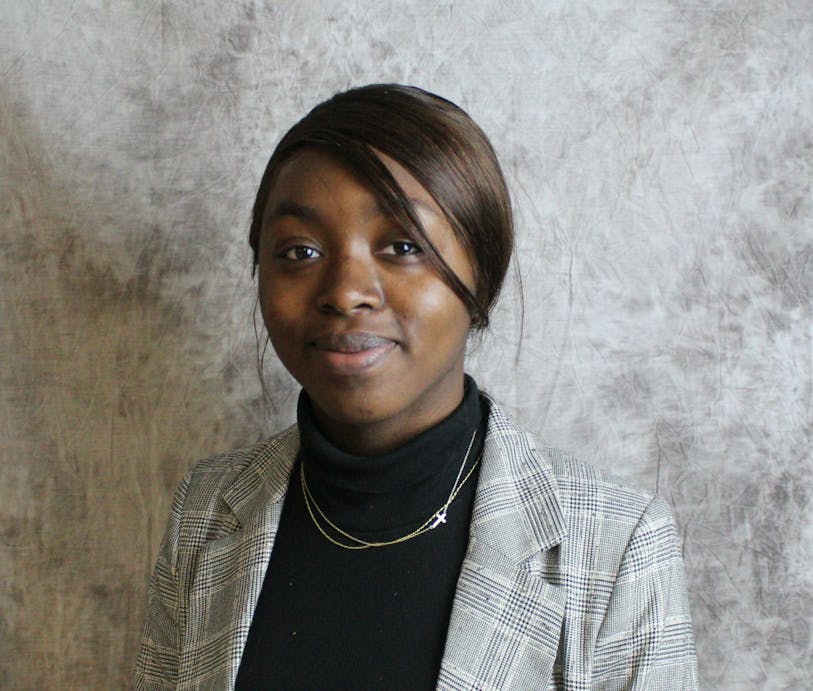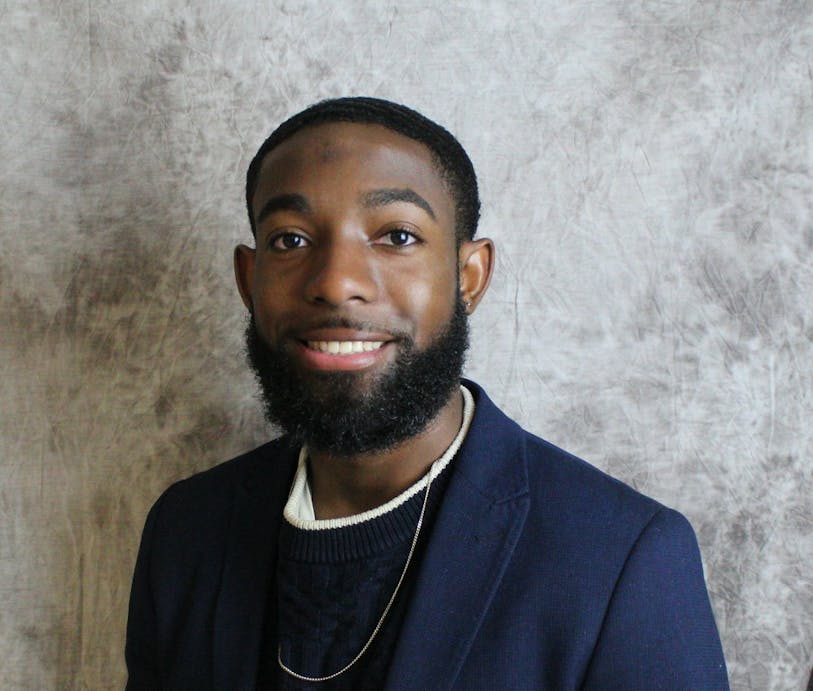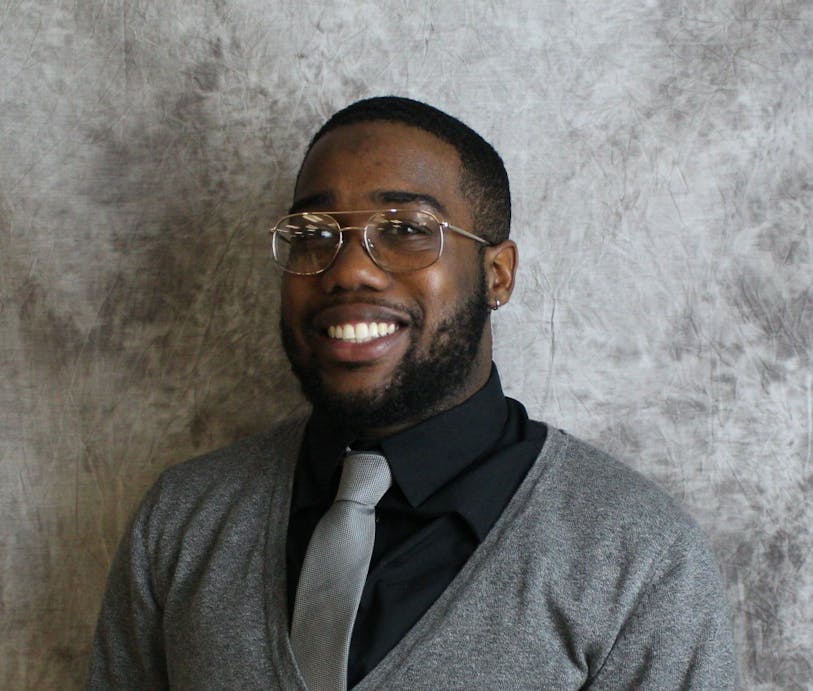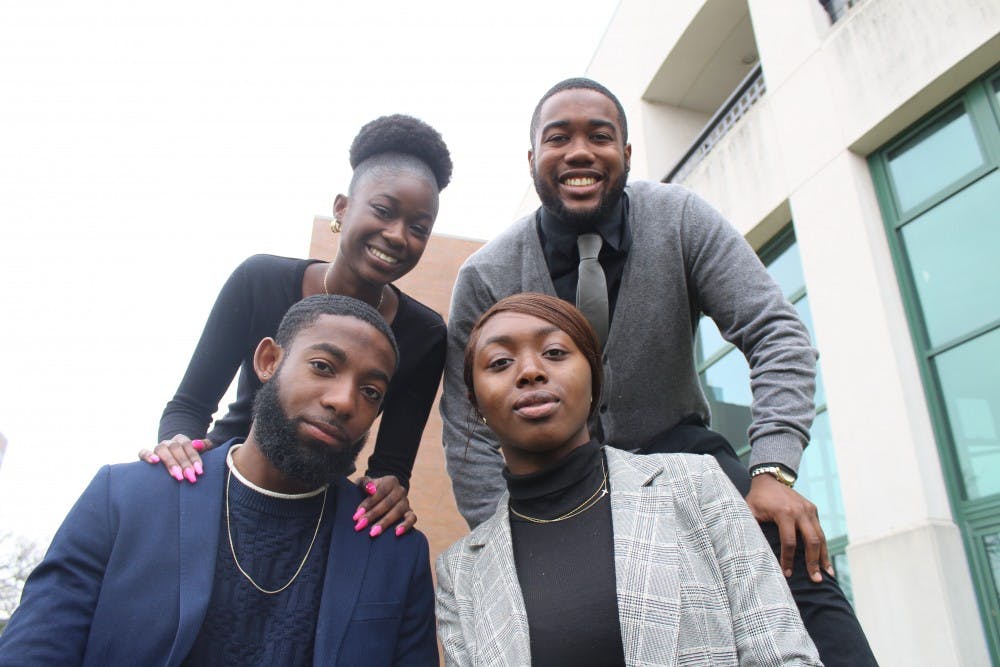The Black Student Union is one of UB’s oldest and the largest minority club.
With thousands of students taking part over its 50-plus year history, BSU’s incoming e-board hopes to retain and grow its reach in the year ahead. The Spectrum sat down with its four student leaders to discuss what’s ahead, why they joined and the value of their organization in 2019.
Florence Ayeni
BSU president
Senior, health and human services major

Ayeni admits that when she initially joined BSU, she did not know the organization had such a prominent role on campus.
When she ran for publicity coordinator during her freshman year, she wore jeans and flats.
It didn’t work in her favor.
But she said she needed the experience, even if it was an awkward way to start.
“Even after that, when people get denied a position, usually they stop supporting the club but for me, it was about gaining more insight, more information and knowledge from such a club and relating to them,” Ayeni said.
She stuck with the club, drawing closer to BSU thanks to members like former BSU president Samirra Felix. Ayeni was inspired by members speaking knowledgeably about black history during general body meetings as well as BSU’s community impact, including rallies and statements members made to past UB presidents.
“I feel like it’s really important that we carry on that same type of spirit, and it’s really important that we touch the African American community on this campus,” Ayeni said.
One of the ways she hopes to do that is through being an advocate for mental health, like through her Creative Minds event in New York City which she organized in June. She recognizes that mental health is an important aspect of students’ daily lives, something she saw firsthand with her brother who has schizophrenia.
On top of her work as a student leader, Ayeni is an entrepreneur who oversees a number of different organizations, including Go With The Flo, which has campaigned against African American teenagers being victims of gun violence.
Glenn Brown
BSU vice president
Junior, political science major

It’s important to Brown that he continues BSU’s legacy.
One of his goals as the organization’s vice president is for students to recognize their cultural history as well as BSU’s history.
“Next year, we want to give people that visual thinking of, ‘how do we make the next steps happen,’” Brown said. “One key is to give them a context of what we were able to do in the past, give them a context of how they can be more active as an individual rather than just speaking about it. That is what BSU was founded on and that’s what we want to carry on as well.”
Part of this drive for Brown is so he, too, can analyze and speak about his own history.
“Growing up, my parents always taught me or sat me down to just speak about my history of being black ...” Brown said. “But it’s hard to be able to get somewhere if you’re not able to see it in yourself, so BSU is that ability to do that. We have alumni we could use to show where you could be and how you could do that as well.”
He said he doesn’t just want his club to target black students, but students of other races to “analyze the history.”
“We’ve always been taught the struggle of being black, period, and not about the aspect of the empowerment or how you could be able to take that struggle and lead it to something else,” Brown said. “We don’t want to move backward, we want to move forward, and that’s the key we want to [use] next year.”
Awa Magassouba
BSU treasurer
Sophomore, psychology, sociology, criminology major

Magassouba is in her second year and, in the future, wants to help people with mental illnesses, as she sees problems in the way the medical industry treats them.
She said her decision to run for an e-board position came “out of nowhere.”
But after “ups and downs” during the club’s election process, she discovered the uplifting nature of the club throughout its history is something she also stands for.
“I’m always looking to help someone, I’m always looking to have unity, I don’t like segregation or anyone not being welcome,” Magassouba said.
“I joined because I feel like this is a really good organization and I would love to add on to the legacy that it has. I’d love to be able to shed light on the problems that we face now in today’s society and what we faced previously. Like Flo and Glenn said, the history is the most important aspect of BSU because without the history, there would be no BSU.”
She recognizes that BSU plays a big role at UB and wants to take part in the club’s efforts to educate the student body.
“I’m a person that believes every day you should learn something new and I honestly feel like there’s a lack of education in terms of diversity on this campus,” Magassouba said. “I feel like if people don’t know about it, we can’t really be upset but more so we should educate them for the future.”
Varnel Fleurisma
BSU secretary
Fifth year senior, public health major

Fleurisma has explored UB’s BSU archives on the fourth floor of Capen Hall.
And history has stood out to him.
He recalls discovering a file that described a BSU president walking to campus in the ‘70s. The student, Fleurisma said, was stopped by campus police who asked for his ID. The student didn’t provide it to officers, who later arrested the student on the grounds that he either resisted arrest or attacked officers.
Fleurisma said the charges were dropped at the time but he drew parallels to the situation in the ‘70s to arrests by police officers happening today.
“This is being seen more because of social media. … It’s things like that where I feel [like] law enforcement takes advantage of that authority and there’s no repercussions for it,” Fleurisma said. “Every day on Twitter, I see another black male or a minority being abused by law enforcement, they’re the people that are supposed to protect us but we’re afraid of them at the same time.”
He said the archive took him back to Trayvon Martin’s death in 2012, where the justice system and law enforcement personally failed him. Fleurisma said UPD hasn’t really been a problem for the community but if an arrest or tragedy were to happen at UB, he recognizes the power BSU has to be that voice just as it was in the ‘70s.
“I feel like that’s something we all can be, I feel like every person on the e-board has a strong, powerful voice as an individual and when we come together, we can be heard,” Fleurisma said.
Fleurisma is also passionate about spreading awareness for various resources and departments on campus.
He said he feels like a lot of resources on campus are “word of mouth,” like International Student Services or the Academic Resource Center.
“Yes, [these resources are] posted in a pamphlet somewhere or it’s in a packet during orientation but, let’s be honest, how many people read that little pamphlet or a page your RA gives you?” Fleurisma said.
He said he’s inspired by African American Studies professors such as James Pappas and Y.G. Lulat and sees the way they harvest history in their classrooms.
“I kind of find it funny that during Black History Month, UB [was not] marketing the African American Studies [program], why is that not something that’s being done?” Fleurisma said.
He said UB needs to do more for its programs, but it’s up to students to put the pressure on it to do more.
The Spectrum’s full discussion with the BSU e-board can be heard on our SoundCloud: https://soundcloud.com/thespectrumub
Benjamin Blanchet is the engagement editor and can be reached on Twitter at @BenjaminUBSpec and benjamin.blanchet@ubspectrum.com

Benjamin Blanchet is the senior engagement editor for The Spectrum. His words have been seen in The Buffalo News (Gusto) and The Sun newspapers of Western New York. Loves cryptoquip and double-doubles.





